并列复合句与状语从句
专题12并列句和复合句(二)(定语从句状语从句)(复习讲义)-2023年中考英语二轮复习讲练测(全国
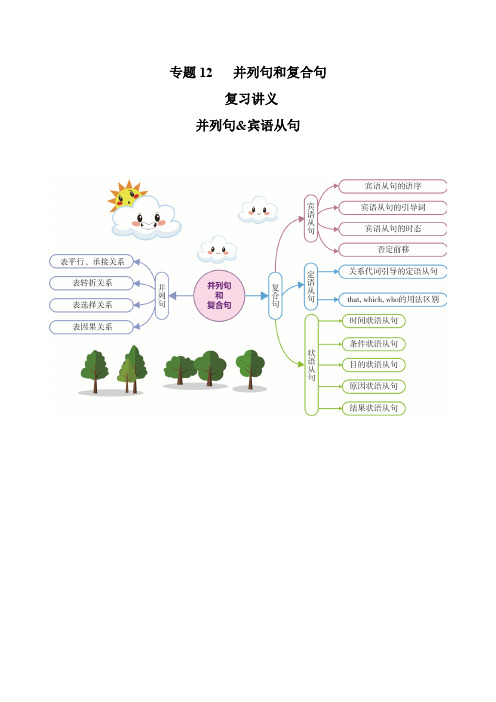
专题12 并列句和复合句复习讲义并列句&宾语从句由并列连词把两个或两个以上的简单句连接起来的句子叫并列句。
常见分类:1. 表平行或承接:and, both … and … , not only … but also … , neither … nor … , as well as等;2. 表转折:but, yet, while等;3. 表选择:or, not … but, either … or …等;4. 表因果:as, for, so等。
1.(2023·天津·模拟预测)The dress is very nice, ________it doesn’t look good on me.A.or B.but C.so D.until【答案】B【解析】句意:这件衣服很漂亮,但我穿起来不好看。
考查连词辨析。
or或者,表选择;but但是,表转折;so所以,表结果;until直到,表时间。
根据句意语境,可知本句前后是转折关系,需用but连接,故选B。
2.(2022·重庆渝中·重庆巴蜀中学校考三模)—What a heavy rain!—You’d better set out a little earlier, ________ you’ll be late for school.A.and B.but C.or D.so【答案】C【解析】句意:——雨下得真大啊!——你最好早一点出发,否则你会上学迟到的。
考查并列连词辨析。
and并且,和;but但是;or否则;so所以。
根据“You’d better set out a little earlier”可知你最好早点出发,如果不这样做的话,就会迟到。
因此应用or“否则,要不然”连接。
故选C。
3.(2022·天津红桥·统考模拟预测)The shops were closed ________ I couldn’t buy anything.A.so B.but C.so that D.after【答案】A【解析】句意:商店关门了,所以我什么都买不到。
并列句和复合句-从句

从句引导词
例句
时间状 语从句
when, while, before, after, until, since, as soon as
①He didn’t get home until 9 p. m. last night. 他直到昨天晚上九点才到家。 ②I’ll call you up as soon as I arrive in Beijing. 我一到北京就给你打电话。
二、关系代词的基本用法
作主语 指人 who/that which/ that 作宾语 who/whom/that/省略 which/that/省略 作定语 whose whose
指物
Do you know the girl who/ that has won the first prize in
2. 以下情况只用who/ whom:
(1)先行词是anyone, anybody, one, ones, those等
Anyone who breaks the law will be punished. 任何违法之人都将受到处罚。
There are some boys who are playing (2) 在 there be 结构中,先行词指 basketball on the playground. 操场上有些 人时,关系代词用who 男孩在打篮球。
3. 结果状语从句中的特殊句式
(1) 祈使句 +and + 简单句:祈使句 Eat more vegetables and less meat, and 表示条件,and引导的简单句表示 you’ll keep in good health. 多吃菜少吃肉, 在条件的基础上产生的良好结果, 你会保持健康的。 前后句意统一 (2) 祈使句 +or+ 简单句:祈使句表 示条件, or 引导的简单句表示在 违背条件的基础上可能产生的不 良后果,前后句意对立。 or 在句 中表示“否则”,可与if引导的从 句进行替换 Keep quiet, or you won’t hear what the teacher says. =Keep quiet, and you will hear what the teacher says. =If you don’t keep quiet, you won’t hear what the teacher says. 保持安静,否则你 听不见老师在说什么。
句式杂糅的常见类型

句式杂糅的常见类型句式杂糅的常见类型1. 并列句杂糅在句式杂糅中,一种常见的类型是并列句的杂糅。
并列句是由两个或多个具有相同等级关系的句子连接而成的复合句。
杂糅就是将不同种类的并列句结构混合在一起,形成复杂多样的句式结构。
在并列句杂糅中,不仅有简单的主谓结构,还有复杂的从句结构,从而增加了句子的表达力和变化性。
示例:- I like eating apples and I think they are good for my health.- He is a talented singer and he has a great sense of humor.- She enjoys reading books and she has a collection of novels.2. 并列复合句杂糅除了并列句杂糅外,另一种常见的类型是并列复合句的杂糅。
并列复合句由两个或多个并列从句组成的复合句,在结构上更为复杂。
并列复合句的杂糅结合了不同类型的并列从句,使句子更具层次感和丰富性。
示例:- Although she was tired, she stayed up late to finish her work, and she was determined to complete it.- I studied hard for the exam, but I still didn't do well, so I decided to seek help from my teacher.- He loves traveling, so he saved up money and planneda trip to Europe.3. 状语从句杂糅状语从句是句子中起修饰作用的从句,提供了背景、条件、目的等信息。
状语从句的杂糅是将不同类型的状语从句混合在一起,使句子更加丰富多彩。
示例:- When the rn stopped, we went out for a walk, and the sun came out.- Although it was late, she decided to go to the gym, and she had a great workout.- As he was tired, he went to bed early, and he got a good night's sleep.4. 定语从句杂糅定语从句是用来修饰名词或代词的从句,对先行词进行限定或说明。
并列句与复合句的区别及用法

并列句与复合句的区别及用法在英语写作中,我们经常使用并列句和复合句来丰富句子结构,增强表达效果。
并列句和复合句在句子的组织和信息表达上有着不同的特点和用法。
本文将详细介绍并列句与复合句的区别,并探讨它们在写作中的常见用法。
一、并列句并列句是由两个或多个主观并列的句子组成的。
这些句子在逻辑上平等,彼此之间没有从属关系。
并列句的主要特点是句子之间使用逗号、分号或连词(如and、but、or等)来连接。
并列句通常用于表达出列举、对比、选择等关系。
1. 列举:当我们想要表达多个事物、观点或行动时,我们可以使用并列句来进行列举。
例如:I like swimming, hiking, and playing basketball.2. 对比:并列句也可以用来表达对比关系,表示两个相互独立但相对的事物或观点。
例如:She is hardworking, but her brother is lazy.3. 选择:有时我们需要在两个或多个选项之间进行选择,此时并列句可以派上用场。
例如:You can either go to the party or stay at home and watch a movie.在使用并列句时,我们需要注意句子之间的平衡性和逻辑关系,以确保句子结构紧凑、顺畅。
二、复合句复合句由一个主句和一个或多个从句(即依存从句)组成。
从句在句子中充当某个成分(如主语、宾语、状语等),并且与主句之间存在从属关系。
复合句的主要特点是使用诸如关联词(如that, which, who, when, where, why等)或连词(如although, because, while, and等)来引导从句。
1. 名词性从句:复合句中的名词性从句可以作为主语、宾语、表语等。
例如:What he said made me happy.(主语从句)I believe that he is innocent.(宾语从句)The fact is that he is the best candidate for the job.(表语从句)2. 定语从句:复合句中的定语从句用于修饰一个名词或代词。
(完整版)并列句和状语从句讲解
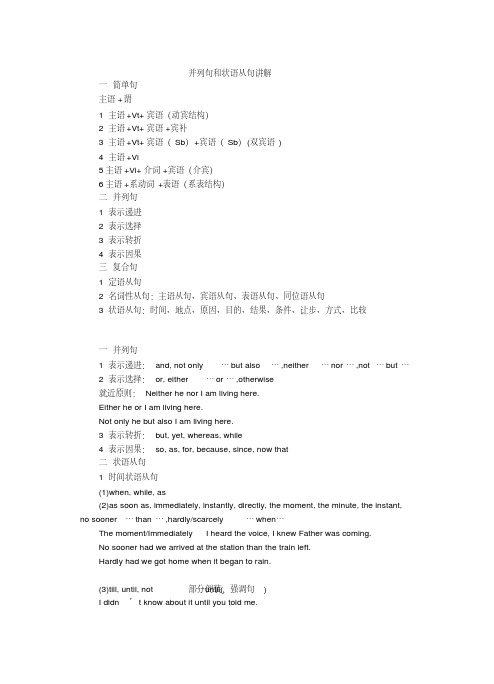
重要的连词辨析 1 as 做连词,引导时间、让步、方式、原因和定语从句 He hurried home, looking behind as he went. (时间) You will grow wiser as you grow older. (时间) Fail as I might, I still want to attempt it. (让步) Child as he is, he can lift such a heavy box. (让步) Little as he is, he can lift such a heavy box. (让步)
the’y ctaangre’e tthbaet solved.
Some men are rich, while others are poor.
状语从句中的倒装
Not only did he speak more correctly, but also he spoke more easily.
Neither does he work hard, nor does his brother.
Such a clever student was he that he was able to work out all the problems.
though 连词 “虽然 ”让步状语从句
Though it was raining hard, yet they went on playing football.
4 地点状语从句
Where, wherever, everywhere, nowhere
5 方式状语从句
as, as if, as though
6 结果状语从句
(1)so that, so
简单句并列句及状语从句
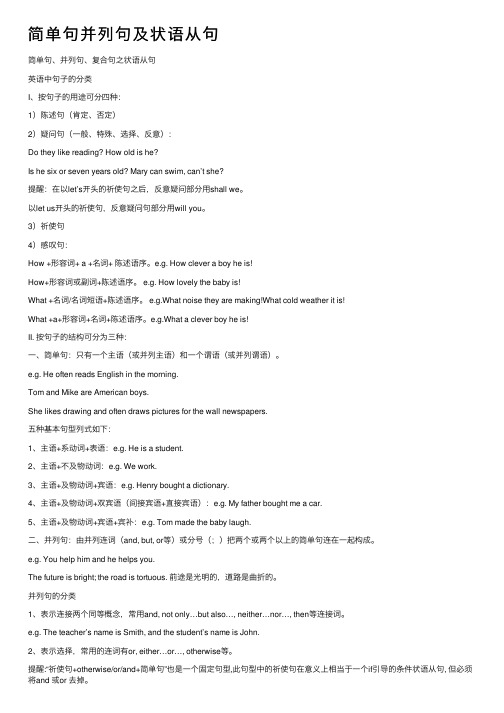
简单句并列句及状语从句简单句、并列句、复合句之状语从句英语中句⼦的分类I、按句⼦的⽤途可分四种:1)陈述句(肯定、否定)2)疑问句(⼀般、特殊、选择、反意):Do they like reading? How old is he?Is he six or seven years old? Mary can swim, can’t she?提醒:在以let’s开头的祈使句之后,反意疑问部分⽤shall we。
以let us开头的祈使句,反意疑问句部分⽤will you。
3)祈使句4)感叹句:How +形容词+ a +名词+ 陈述语序。
e.g. How clever a boy he is!How+形容词或副词+陈述语序。
e.g. How lovely the baby is!What +名词/名词短语+陈述语序。
e.g.What noise they are making!What cold weather it is!What +a+形容词+名词+陈述语序。
e.g.What a clever boy he is!II. 按句⼦的结构可分为三种:⼀、简单句:只有⼀个主语(或并列主语)和⼀个谓语(或并列谓语)。
e.g. He often reads English in the morning.Tom and Mike are American boys.She likes drawing and often draws pictures for the wall newspapers.五种基本句型列式如下:1、主语+系动词+表语:e.g. He is a student.2、主语+不及物动词:e.g. We work.3、主语+及物动词+宾语:e.g. Henry bought a dictionary.4、主语+及物动词+双宾语(间接宾语+直接宾语):e.g. My father bought me a car.5、主语+及物动词+宾语+宾补:e.g. Tom made the baby laugh.⼆、并列句:由并列连词(and, but, or等)或分号(;)把两个或两个以上的简单句连在⼀起构成。
复合句的构成与种类
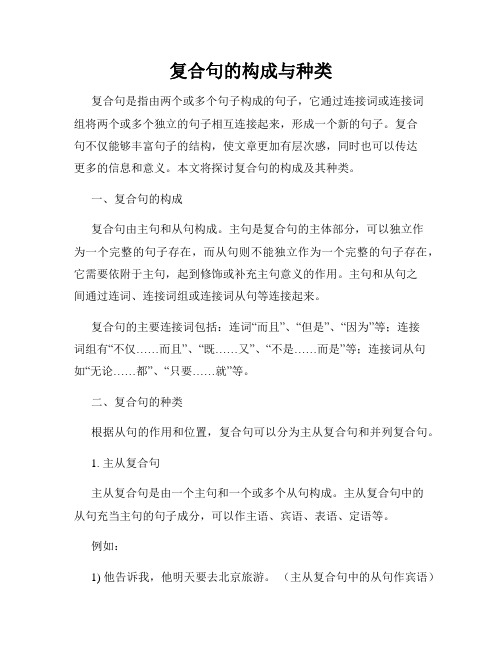
复合句的构成与种类复合句是指由两个或多个句子构成的句子,它通过连接词或连接词组将两个或多个独立的句子相互连接起来,形成一个新的句子。
复合句不仅能够丰富句子的结构,使文章更加有层次感,同时也可以传达更多的信息和意义。
本文将探讨复合句的构成及其种类。
一、复合句的构成复合句由主句和从句构成。
主句是复合句的主体部分,可以独立作为一个完整的句子存在,而从句则不能独立作为一个完整的句子存在,它需要依附于主句,起到修饰或补充主句意义的作用。
主句和从句之间通过连词、连接词组或连接词从句等连接起来。
复合句的主要连接词包括:连词“而且”、“但是”、“因为”等;连接词组有“不仅……而且”、“既……又”、“不是……而是”等;连接词从句如“无论……都”、“只要……就”等。
二、复合句的种类根据从句的作用和位置,复合句可以分为主从复合句和并列复合句。
1. 主从复合句主从复合句是由一个主句和一个或多个从句构成。
主从复合句中的从句充当主句的句子成分,可以作主语、宾语、表语、定语等。
例如:1) 他告诉我,他明天要去北京旅游。
(主从复合句中的从句作宾语)2) 这是我小时候读过的那本书,我一直都记得。
(主从复合句中的从句作定语)主从复合句可以根据从句的类型进一步划分为名词性从句、定语从句和状语从句。
- 名词性从句:在主句中充当名词的作用,可以作主语、宾语、表语或同位语。
常见的名词性从句有主语从句、宾语从句、表语从句和同位语从句。
- 定语从句:在主句中充当定语的作用,修饰名词或代词。
- 状语从句:在主句中充当状语的作用,表示时间、条件、原因、目的、结果等。
2. 并列复合句并列复合句由两个或多个并列的主句和一个或多个从句构成,并列的主句之间通过并列连词连接,从句则可以修饰主句或从句。
例如:1) 我喜欢跳舞,你喜欢唱歌。
(并列复合句中的从句修饰主句)2) 她很高兴,因为她考试取得了好成绩。
(并列复合句中的从句修饰从句)并列复合句的连词包括“而且”、“不仅……而且”、“或者”等。
英语中的“句子合并”
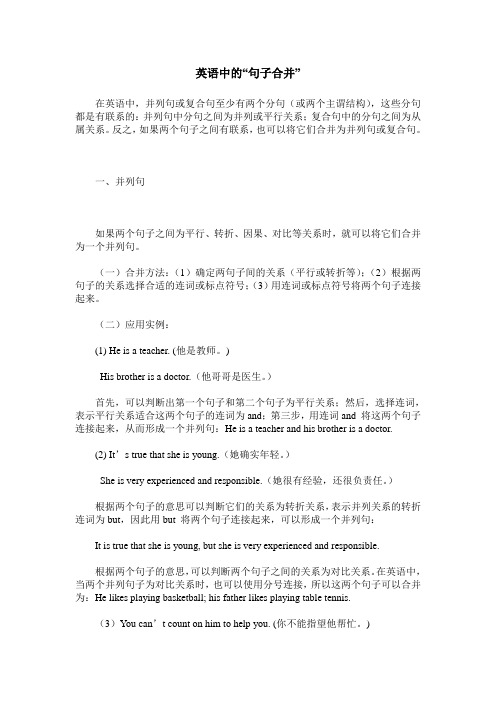
英语中的“句子合并”在英语中,并列句或复合句至少有两个分句(或两个主谓结构),这些分句都是有联系的:并列句中分句之间为并列或平行关系;复合句中的分句之间为从属关系。
反之,如果两个句子之间有联系,也可以将它们合并为并列句或复合句。
一、并列句如果两个句子之间为平行、转折、因果、对比等关系时,就可以将它们合并为一个并列句。
(一)合并方法:(1)确定两句子间的关系(平行或转折等);(2)根据两句子的关系选择合适的连词或标点符号;(3)用连词或标点符号将两个句子连接起来。
(二)应用实例:(1) He is a teacher. (他是教师。
)His brother is a doctor.(他哥哥是医生。
)首先,可以判断出第一个句子和第二个句子为平行关系;然后,选择连词,表示平行关系适合这两个句子的连词为and;第三步,用连词and 将这两个句子连接起来,从而形成一个并列句:He is a teacher and his brother is a doctor.(2) It’s true that she is young.(她确实年轻。
)She is very experienced and responsible.(她很有经验,还很负责任。
)根据两个句子的意思可以判断它们的关系为转折关系,表示并列关系的转折连词为but,因此用but 将两个句子连接起来,可以形成一个并列句:It is true that she is young, but she is very experienced and responsible.根据两个句子的意思,可以判断两个句子之间的关系为对比关系。
在英语中,当两个并列句子为对比关系时,也可以使用分号连接,所以这两个句子可以合并为:He likes playing basketball; his father likes playing table tennis.(3)You can’t count on him to help you. (你不能指望他帮忙。
- 1、下载文档前请自行甄别文档内容的完整性,平台不提供额外的编辑、内容补充、找答案等附加服务。
- 2、"仅部分预览"的文档,不可在线预览部分如存在完整性等问题,可反馈申请退款(可完整预览的文档不适用该条件!)。
- 3、如文档侵犯您的权益,请联系客服反馈,我们会尽快为您处理(人工客服工作时间:9:00-18:30)。
初中英语分类练习——并列复合句与状语从句并列句专练Ⅰ. 从方框中选择适当的词完成句子。
1.They are happy _______ they deserved their happiness.2.Hurry _______ you will miss the plane.3.I like chocolate, _______ it is bad for teeth.4.I wanted to know the answer, _______ I went to ask him.5.He had a drink, _______ went to bed.Ⅱ. 选择填空:( )1. Be careful, _________ you will fall off the bike.A. butB. andC. soD. or( )2. Edison said, “Never give up, _________ you'll make it.”A. yetB. orC. andD. but( )3. Lucy and Lily are twins. Lucy likes playing table tennis, _________ Lily doesn't.A. orB. butC. andD. yet( )4. Mr. Green knows little German, _________ he can't understand the instructions on the bottle of the pills.A. butB. soC. forD. or( )5. My aunt doesn't have much money, _________ she always enjoys himself.A. butB. andC. orD. so( )6. Which is nearer to us, the sun _______ the moon?A. butB. andC. orD. so( )7. I can’t understand this passage _______ there are no new words in it.A. ifB. becauseC.though D. an( )8. The computer cost me too much, _______ it’s really useful.A. soB. butC. andD. or( )9. There is air _______ water on the moon.A. andB. orC. soD. yet( )10. It’s getting dark, _______they’re still working.A. andB. butC. soD. or( )11. The street was wet, _______ it rained last night.A. becauseB. asC. forD. since( )12. Rose is an English girl, ______ she doesn’t like English food.A. yetB. soC. forD. and( )13. That was our first lesson, _______ she didn’t know all our names.A. forB. butC. soD. or( )14. _______ did she go to see her father, ______ did she want her father to come.A. Either,orB. Not , onlyC. No sooner, thanD. Neither, nor( )15. She didn’t go to school yesterday, ______ he had hurt her legs while climbing the mountain.A. butB. howeverC. orD. for( )16. You can study _____Chinese _____ English.A. not only, butB. either,orC. both , orD. only, and( ) 17. Tom works very hard, _____ his family is still very poor.A. yetB. forC. soD. and( )18. Some are reading newspaper, _____ others are playing basketball.A. orB. forC. soD. while( )19. Maybe he has gone home, ______ he is in his office.A. orB. butC. nor /D. yet( )20. I help him _____ he helps me. We help each other.A. but,B. andC. orD. for( ) 21. The shop is new, _____ it has been open only for three days.A. forB. andC. butD. so( ) 22. You needn’t sweep the floor, ______ it’s very clean.A. and B but C. or D. for( ) 23. Tom works hard, ______ he still failed in the exam.A. yetB. soC. andD. or( ) 24. I felt tired after the work, _____ I too a long rest.A. so B but C. for D. or( )25. I hate smoking, _____ I don’t like drinking, either.A. thoughB. butC. andD. for( )26. ______ Saturday ______ Sunday is OK. I’ll be free in these two days.A. Either; orB. Neither; norC. Both; andD. One; the other( ) 27. In spring it is_____hot _____ cold here.A. both, andB. either, orC. neither, norD. not only, but( ) 28. Jim was very hungry ______ he ate all the cakes.A. andB. butC. soD. or( )29. Lilei passed his father this cup _____ asked for some more tea.A. butB. andC.orD. if( ) 30. Go along the street, turn to the left at the end of the street and _____ you’ll find the post office.A. thenB. soC. butD. yet状语从句专练Ⅰ.选择填空:1. The man can’t get on the bus because there ________ no room on it.A. wasB. isC. areD. were2. I was listening to the music ________ there was a knock at the door.A. whileB. whenC. becauseD. until3. You may leave the classroom when you ________ writing.A. will finishB. are finishingC. have finishedD. had finished4. I don’t know if he ________ tomorrow, if he _________ ,I’ll meet him.A. will come, comesB. comes, comesC. will come, will comeD. come, will come5. ________ I read, the more I understand.A. The moreB. So muchC. How muchD. For all6. Would you give Johnny this letter if you ________ to see him this week.A. will happenB. happenC. are happenedD. happened7. She was busy, ________ she couldn’t go to your birthd ay party last night.A. andB. soC. orD. but8. English is ________ a useful language ________ it is spoken in many countries of the world.A. so…thatB. such…thatC. so…becauseD. such…because9. You will not succeeded if you ________ harder.A. will workB. won’t workC. workD. don’t work10.Write clearly ________ your teacher can understand you correctly.A. sinceB. forC. becauseD. so that11.________ he failed , he went on doing the experiment.A. EvenB. YetC. AlthoughD. in spite of12.The light went out while we ________ supper.A. hadB. had hadC. were havingD. would have13.His brother has worked there ________ he left school.A. whenB. afterC. sinceD. until14.The boy didn’t stop talking ________ the second bell rang.A. whenB. untilC. afterD. because15. ________ I came into the office, the teacher were having a meeting.A. WhileB. WhenC. OnceD. Since16.I was about to leave my house ________ the telephone rang.A. whileB. asC. whenD. since17.It is at least ten years ________ these trees were planted.A. whenB. beforeC. sinceD. as soon as18.He will come to call on you the moment he ________ his painting.A. finishedB. will finishedC. has finishedD. had finished19.The teacher understands that ________ Maths had always been easy for him, it is not easy for the students.A. sinceB. unlessC. althoughD. when20.He ran as fast as possible ________ he could reach school on time.A. in order toB. so as toC. whenD. so thatⅡ.用动词的适当形式填空:1.It ________ (be) nearly two years since we went to the party last.2.He is hungry, because he ________ (not have ) his breakfast yet.3.When Tom’s mother came home, little Tom _______ (cry) loudly.4.I ________ (not know) it until you ________ (tell) me.5.They started as soon as they ______ (receive)my telephone.6.He ________ (leave) as soon as he ________ (drink) his coffee.7.Edison placed a big mirror behind the lamps so that the doctor ________ (operate).8.He ________(be) better today than he ________ (be) yesterday.9.I hope you ________ (be) happy while you ________ (be)here.10.Whatever ________ (happen) , I ________ (be) on your side.Ⅲ.把下列句子改成带有状语从句的复合句:1.He didn’t come. He was ill. (because)2.He is too young to join the army. (so……that)3.He studies English hard. He is over seventy. (though)4.We will stay at home. It rains. (if)5.He was doing his homework. Someone knocked at the door. (when)6.I waited. He came back. (not……until)7.He is tall. I am tall. (as……as)8.My mother was cooking. I was listening to the news. (while)9.It was a hot day. We couldn’t sleep well. (such……that)10.He came into the warm room. He took off his cap and sat down. (as soon as)Ⅳ.完成下列句子:1.He didn’t see the film yesterday ________________________________ (因为他忙于复习功课).2.She has done a lot of good deeds _______________________________ (自从她入团以来).3.The little girl stopped crying __________________________ (一看见她母亲).4.The film is interesting _______________________ (以致每个人都想再看一遍).5.When I came into the room, _________________________ (我父亲正在看书).6.I will go out for a walk, ________________________ (如果明天不下雨).7.Don’t ask me to repeat ________________________ (除非你真的不理解).8.We will try to finish the work in time _____________________________ (尽管我们缺钱).9.The quicker you work, __________________________ (这项任务就会完成得越早).10.We left in such a hurry __________________________ (以致于忘了关灯).参考答案并列句专练Ⅰ. 1.and 2.or 3.but 4.so 5.thenⅡ.1—5 D C B B A 6—10 C C B A B 11—15 C A C D D 16—20 B A D A B21—25 A D A A C 26—30 A C C B A状语从句专练I、1.B2.B3.C4.A5.A6.B7.B8.B9.C 10.D11.C 12.C 13.C 14.B 15.B 16.C 17.C 18.C 19.C 20.DII、1.is2.has not had3.was crying4.didn’t know, had told5.received6.left, drank7.would operate 8.is, was9.will be, are 10.happens, will beIII、1. He didn’t come because he was ill.2. He is so young that he can’t join the army.3. Though he is over seventy, he studies English hard.4. We will stay at home if it rains.5. He was doing his homework when someone knocked at the door.6. I didn’t leave until he came back.7. He is as tall as I (am)8. My mother was cooking while I was listening to the news.9. It was such a hot day that we couldn’t sleep well.10. He took off his cap and sat down as soon as he came into the warm room. IV、1. because he was busy going over his lessons.2. since he joined the league.3. as soon as she saw her mother.4. so that everyone wants to see it again.5. my father was reading a book.6. if it doesn’t rain.7. unless you really don’t understand.8. although we are short of money.9. the sooner we’ll finish the task.10. that we forgot to turn off the light.。
